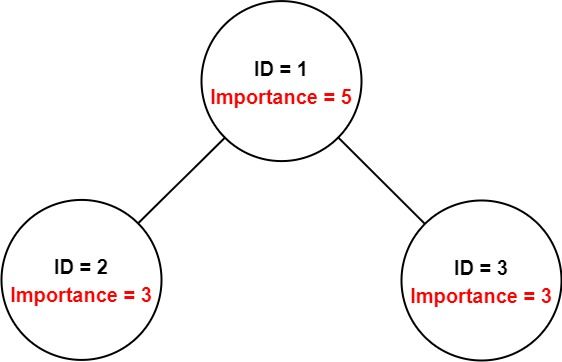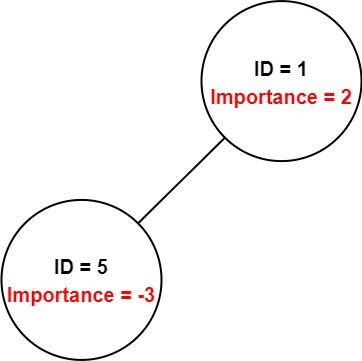Welcome to Subscribe On Youtube
690. Employee Importance
Description
You have a data structure of employee information, including the employee's unique ID, importance value, and direct subordinates' IDs.
You are given an array of employees employees where:
employees[i].idis the ID of theithemployee.employees[i].importanceis the importance value of theithemployee.employees[i].subordinatesis a list of the IDs of the direct subordinates of theithemployee.
Given an integer id that represents an employee's ID, return the total importance value of this employee and all their direct and indirect subordinates.
Example 1:

Input: employees = [[1,5,[2,3]],[2,3,[]],[3,3,[]]], id = 1 Output: 11 Explanation: Employee 1 has an importance value of 5 and has two direct subordinates: employee 2 and employee 3. They both have an importance value of 3. Thus, the total importance value of employee 1 is 5 + 3 + 3 = 11.
Example 2:

Input: employees = [[1,2,[5]],[5,-3,[]]], id = 5 Output: -3 Explanation: Employee 5 has an importance value of -3 and has no direct subordinates. Thus, the total importance value of employee 5 is -3.
Constraints:
1 <= employees.length <= 20001 <= employees[i].id <= 2000- All
employees[i].idare unique. -100 <= employees[i].importance <= 100- One employee has at most one direct leader and may have several subordinates.
- The IDs in
employees[i].subordinatesare valid IDs.
Solutions
“all their subordinates” include “subordinates of subordinates”, first use a hash table to store the mapping relationship between employee.id and employee, and then recursively solve it (it can also be implemented with BFS)
-
/* // Definition for Employee. class Employee { public int id; public int importance; public List<Integer> subordinates; }; */ class Solution { private final Map<Integer, Employee> map = new HashMap<>(); public int getImportance(List<Employee> employees, int id) { for (Employee employee : employees) { map.put(employee.id, employee); } return dfs(id); } private int dfs(int id) { Employee employee = map.get(id); int sum = employee.importance; for (Integer subordinate : employee.subordinates) { sum += dfs(subordinate); } return sum; } } -
""" # Definition for Employee. class Employee: def __init__(self, id: int, importance: int, subordinates: List[int]): self.id = id self.importance = importance self.subordinates = subordinates """ class Solution: def getImportance(self, employees: List['Employee'], id: int) -> int: m = {emp.id: emp for emp in employees} def dfs(id: int) -> int: emp = m[id] s = emp.importance for sub in emp.subordinates: s += dfs(sub) return s return dfs(id) -
/** * Definition for Employee. * function Employee(id, importance, subordinates) { * this.id = id; * this.importance = importance; * this.subordinates = subordinates; * } */ /** * @param {Employee[]} employees * @param {number} id * @return {number} */ var GetImportance = function (employees, id) { const map = new Map(); for (const employee of employees) { map.set(employee.id, employee); } const dfs = id => { const employee = map.get(id); let sum = employee.importance; for (const subId of employee.subordinates) { sum += dfs(subId); } return sum; }; return dfs(id); }; -
/* // Definition for Employee. class Employee { public: int id; int importance; vector<int> subordinates; }; */ class Solution { public: int getImportance(vector<Employee*> employees, int id) { unordered_map<int, Employee*> d; for (auto& e : employees) { d[e->id] = e; } function<int(int)> dfs = [&](int i) -> int { int s = d[i]->importance; for (int j : d[i]->subordinates) { s += dfs(j); } return s; }; return dfs(id); } }; -
/** * Definition for Employee. * type Employee struct { * Id int * Importance int * Subordinates []int * } */ func getImportance(employees []*Employee, id int) int { d := map[int]*Employee{} for _, e := range employees { d[e.Id] = e } var dfs func(int) int dfs = func(i int) int { s := d[i].Importance for _, j := range d[i].Subordinates { s += dfs(j) } return s } return dfs(id) } -
/** * Definition for Employee. * class Employee { * id: number * importance: number * subordinates: number[] * constructor(id: number, importance: number, subordinates: number[]) { * this.id = (id === undefined) ? 0 : id; * this.importance = (importance === undefined) ? 0 : importance; * this.subordinates = (subordinates === undefined) ? [] : subordinates; * } * } */ function getImportance(employees: Employee[], id: number): number { const d = new Map<number, Employee>(); for (const e of employees) { d.set(e.id, e); } const dfs = (i: number): number => { let s = d.get(i)!.importance; for (const j of d.get(i)!.subordinates) { s += dfs(j); } return s; }; return dfs(id); }